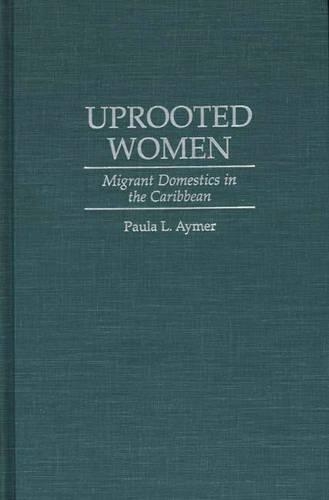
Uprooted Women: Migrant Domestics in the Caribbean
(Hardback)
Publishing Details
Uprooted Women: Migrant Domestics in the Caribbean
By (Author) Paula L. Aymer
Bloomsbury Publishing PLC
Praeger Publishers Inc
16th July 1997
United States
Classifications
Tertiary Education
Non Fiction
Labour / income economics
Anthropology
Migration, immigration and emigration
Civics and citizenship
Sociology: work and labour
331.62729
Physical Properties
Hardback
184
Description
A socio-historical and ethnographic account of pioneering Anglophone eastern Caribbean women who signed up to be migrant domestics in the Caribbean oil lands. This book provides an explanation of the migration culture of the Caribbean by injecting gender into traditional labor migration theories. It views labor migration from the female migrant women's perspective as a major entrepreneurial activity for those who refuse to be fazed by foreign nation-state boundaries. Aruba, the site of a giant U.S.-owned oil refinery, became a major participant in supplying Western Europe's and North America's insatiable oil needs during the decade of the 1940s and World War II. Therefore, the island is presented as the prototype of a 20th-century industrial worksite that attracted the female migrant labor flow. The book argues that this female migration created a long-term relationship between black female migrant workers from the eastern Caribbean and the non-black middle-class households on Aruba. In addition, wage-earning efforts of migrant labor in the oil enclave expanded and intensified female intra-regional petty trading activities and stimulated the interests of eastern Caribbean women in new labor sites outside of the Caribbean.
Reviews
.,."fresh lens on a common problem. Inequalities, work and occupations, and migration are areas enhanced by this research."-Politics, Social Movements, and the State
...fresh lens on a common problem. Inequalities, work and occupations, and migration are areas enhanced by this research.-Politics, Social Movements, and the State
[Aymer] succeeds in placing the women's individual experiences within the broader context of labor history and migration, and in analyzing the structures of class, gender and racial oppression that affect them, while informing readers of their human dilemmas and responses.-Choice
Although the small island of Aruba is the geographical context, this thoughtful work has wider relevance, and much wider significance. It makes a significant contribution.-International Migration Review
This is a novel and fascinating study. Aymer has made an original and most interesting contribution to the field.-American Journal of Sociology, March 1999
"Aymer succeeds in placing the women's individual experiences within the broader context of labor history and migration, and in analyzing the structures of class, gender and racial oppression that affect them, while informing readers of their human dilemmas and responses."-Choice
..."fresh lens on a common problem. Inequalities, work and occupations, and migration are areas enhanced by this research."-Politics, Social Movements, and the State
"Although the small island of Aruba is the geographical context, this thoughtful work has wider relevance, and much wider significance. It makes a significant contribution."-International Migration Review
"This is a novel and fascinating study. Aymer has made an original and most interesting contribution to the field."-American Journal of Sociology, March 1999
"[Aymer] succeeds in placing the women's individual experiences within the broader context of labor history and migration, and in analyzing the structures of class, gender and racial oppression that affect them, while informing readers of their human dilemmas and responses."-Choice
Author Bio
PAULA L. AYMER is Professor of Sociology and Anthropology at Tufts University in Medford, Massachusetts.
